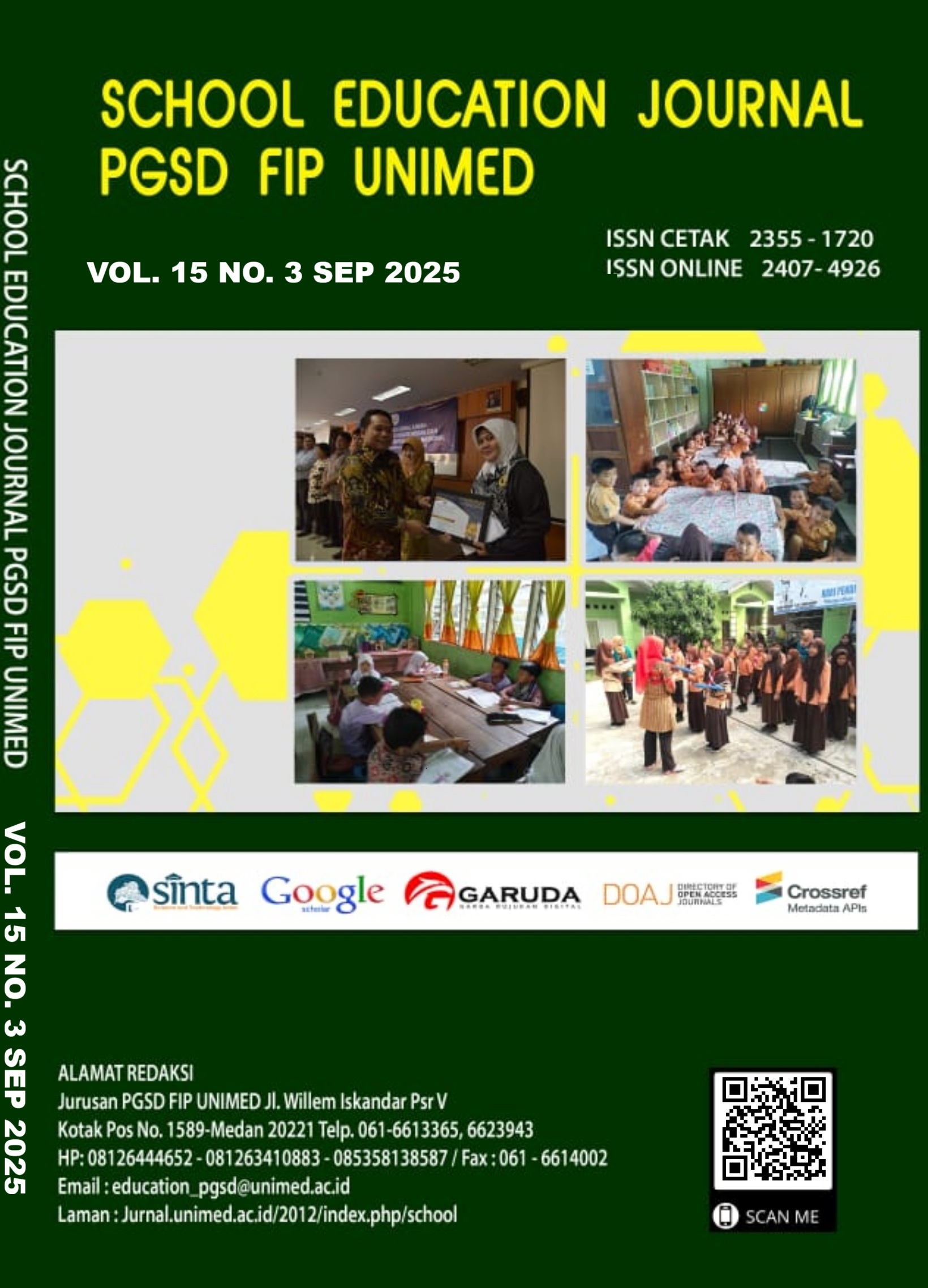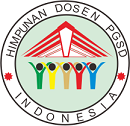PENGARUH MODEL PEMBELAJARAN PBL TERHADAP HASIL BELAJAR DAN KECERDASAN EMOSIONAL SISWA KELAS V MATA PELAJARAN MATEMATIKA
DOI:
https://doi.org/10.24114/sejpgsd.v15i3.66638Keywords:
Problem Based Learning Model, Learning Outcomes, Emotional IntelligenceAbstract
Many students tend to give up easily when faced with Mathematics lessons. This has an impact on less than optimal learning outcomes. One of the main causes is the low self-confidence of students in understanding and solving mathematics problems, so they are afraid of failing and reluctant to try. Lack of self-confidence in their own abilities makes students unmotivated to learn optimally. Therefore, this study aims to determine whether there is an influence and difference in learning outcomes and emotional intelligence of students taught with the PBL model and the contextual model and how it is implemented at SDIT Nurul Islam Singkawang. This study uses a quantitative approach involving grade V students. Data collection was carried out through pretest, posttest and questionnaire questions. The results of this study indicate that differences in student learning outcomes are caused by PBL steps that have a positive influence by placing students as active subjects of learning, while differences in students' emotional intelligence are caused by the PBL model which provides space for students to express themselves and provide influence because the characteristics of PBL are in line with indicators of emotional intelligence.References
Barrows, H. S., & Tamblyn, R. M. (2020). Problem-Based Learning: An Approach to Medical Education. New York: Springer Pub. (Relevan untuk adaptasi model ke jenjang SD dengan pendekatan child-centered learning).
Busdayu, Z. A., Rahmawati, N., & Setiadi, D. (2023). Penerapan Model Pembelajaran Problem Based Learning dalam Meningkatkan Keterampilan Berpikir Tingkat Tinggi (HOTS). Journal of Classroom Action Research, 5(4), 449–453. 10.29303/jcar.v5i4.5537
Djonomiarjo, T. (2020). Pengaruh model problem based learning terhadap hasil belajar. Aksara: Jurnal Ilmu Pendidikan Nonformal, 5(1), 39-46. http://dx.doi.org/10.37905/aksara.5.1.39-46.2019
Fauzi, A., Sawitri, D., & Syahrir, S. (2020). Kesulitan Guru Pada Pembelajaran Matematika Di Sekolah Dasar. Jurnal Ilmiah Mandala Education, 6(1). http://dx.doi.org/10.58258/jime.v6i1.1119
Hmelo-Silver, C. E. (2017). Facilitating collaborative knowledge building. Educational Psychologist, 52(2), 88–100. https://doi.org/10.1080/07370000701798495
Hmelo-Silver, C. E. (2017). Problem-based learning: What and how do students learn?. Educational Psychology Review, 29(2), 233–252. https://doi.org/10.1023/B:EDPR.0000034022.16470.f3
Mursalin. (2016). Pembelajaran Geometri Bidang Datar di Sekolah Dasar Berorientasi Teori Belajar Piaget. DIKMA: Jurnal Pendidikan Matematika), 4(2), 250–258. http://repository.unimal.ac.id/id/eprint/2482
Patimah, Siti. (2020). Pengaruh Kecerdasan Emosional Terhadap hasil Belajar Matematika Siswa. Metode Penelitian Pendidikan. Bandung: Penerbit Alfabeta. 86.
Raharjo, S. (2020). Peningkatan Hasil Belajar Siswa Kelas 4 Melalui Model Pembelajaran Project Based Learning dengan Berbantu Media Youtube. Social, Humanities, and Education Studies (SHEs): Conference Series, 4(1), 1–23. https://doi.org/10.20961/shes.v3i4.55684
Savery, J. R. (2019). Overview of problem-based learning: Definitions and distinctions. Interdisciplinary Journal of Problem-Based Learning, 13(2), Article 2. https://doi.org/10.7771/1541-5015.1002
Savery, J. R. (2019). Problem-based learning: An instructional model and its constructivist framework. Interdisciplinary Journal of Problem-Based Learning, 13(2), 9–20. https://www.jstor.org/stable/44428296
Suryatni, L. (2020). Kecerdasan Emosional Dan Perilaku Manusia (Dalam Perspektif Antropologi) Luh Suryatni. Jurnal Mitra Manajemen, 7(2). https://doi.org/10.35968/jmm.v7i2.530
Vera, K., & Wardani, K. W. (2018). Peningkatan keterampilan berfikir kritis melalui model problem based learning berbantuan audio visual pada siswa kelas IV SD. Jurnal Riset Teknologi dan Inovasi Pendidikan (JARTIKA), 1(2), 33-45. https://journal.rekarta.co.id/index.php/jartika/article/view/252
Additional Files
Published
Issue
Section
License
Copyright (c) 2025 SCHOOL EDUCATION JOURNAL PGSD FIP UNIMED

This work is licensed under a Creative Commons Attribution-ShareAlike 4.0 International License.
Authors whose manuscripts are approved are approved as follows:
- The publication rights for all journal manuscript materials published/published on the SEJ (School Education Journal) E-Journal site are held by the editorial board with the author's knowledge (moral rights remain with the manuscript authors).
- The formal legal requirements for accessing this electronic digital journal article are subject to the terms of the Creative Commons Attribution-ShareAlike (CC BY-SA 4.0) license, which means that E-Journal SEJ (School Education Journal) has the right to store, transfer media/format, manage in the form of a database, maintain, and publish articles without asking permission from the author as long as the author's name remains as the copyright owner.
- Manuscripts published/published electronically are open access for educational, research, and library purposes.













